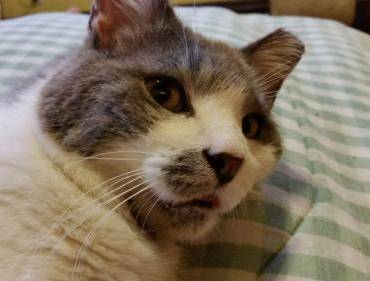Let’s start with the basics
FIV stands for Feline Immunodeficiency Virus. It’s a slow developing, life long retrovirus of the lymph nodes and white blood cells that eventually weakens the immune system.
Approximately 1.5 – 3% of all cats in the USA have FIV. A cat may be infected with FIV for years before any symptoms show up. With the proper diet and veterinary care, cats with FIV commonly live average lifespans.
Now before we go on – let’s be clear –
FIV poses no danger to humans or other types of animals, like dogs . And the risk of infection for other cats in the household is very minimal.
Passing the infection from one cat to another CANNOT occur through casual contact. Many FIV+ cats live in multi cat households with FIV- cats and there are no issues.

FIV Transmission – How it Happens
Deep Bite Wounds
This is by far the most common source of FIV transmission. We’re not talking about a playful nip among feline friends, either. We’re talking about aggressive biting that results in deep wounds that draw blood. The blood mingles with infected saliva, and the virus is transmitted.
In Utero
A mother cat with FIV may pass it on to her unborn babies. This is not common as the majority of FIV+ cats are male. FIV is generally not considered to be sexually transmitted; why male cats are more likely to get FIV is explained in detail in the next section.
Is My Cat at Risk?
The short answer is – probably not. If you keep your cat indoors, the risk is practically non existent. An FIV vaccine exists if you want extra protection (in case the cat gets outdoors) but it’s not 100% reliable.
If you allow your cat outdoors – especially if it’s an intact male – the risks go up substantially.
Here’s why:
Male cats, especially intact ones, are territorial and can be very aggressive if an unfamiliar cat comes around. And let’s face it – you may think your cat can hold their own, but he/she is no match for a territorial feral cat.
We’ve had many FIV+ cats come through our program – the vast majority being male. And all share a loving and friendly disposition. This emphasizes the fact that friendly cats don’t belong on the street. They always end up victim to the bigger, the stronger, and the meaner. Unfortunately, those big and mean tomcats may be carrying FIV.
Symptoms of FIV
Symptoms of FIV may not be apparent for several years. If your cat has been bitten, get them to a vet and have them checked out. There are blood tests for FIV – however, the cat must be producing antibodies for the blood test to detect it. Early on, it’s very possible to get a false negative result. Monitor your cat’s behavior and take them back to the vet if you notice any of the following:
- loss of appetite
- inflammation of the mouth and gums
- recurrent fever and infections: bladder, urinary, upper respiratory
- poor coat condition
- eye and/or neurological problems
- diarrhea
This symptom list is not all inclusive – less common/rare symptoms are not listed.
FIV Prevention & Care
- First and foremost – keep your cats inside!
- Reduce your cat(s) urges to wander by having them spayed or neutered.
- Feed your cat(s) a healthy diet and provide fresh water at all times.
- Visit the vet regularly. Sometimes they can pick up on things we can’t – that’s why they’re there!
- Vaccinate! There is an FIV vaccine; as mentioned it’s not 100% effective, but it can only help.
- If your cat does have FIV, be proactive if they seem ill or aren’t acting like themself. You know your cat best, so when in doubt, take them to the vet. With a weakened immune system, minor illnesses such as a respiratory infection can turn into something much worse if left untreated for too long.
A Happy Ending with FIV

The is Aspen. A cat who had the odds against him and triumphed. He was on the immediate euthanasia list at an Animal Control facility in Southern IL. Roughly 8-10 years of age – and FIV+ – Aspen was what many would view as hard to adopt.
It was apparent that someone, at some point, had dearly loved this cat. It was evident in how comfortable and calm he was with people. But Aspen lost his way somewhere. He ended up on the streets with FIV and was severely attacked by a dog or coyote. An animal control worker fostered him while he recovered.
Aspen touched my heart during our short time together at the pet store while he was awaiting adoption. I felt a connection to him instantly. He had an old soul; you could see it in his eyes. Life had not treated him kindly, but he was resilient, loving and gentle. In the end, his family found him. In no time at all, Aspen found a new home with loving humans, two more kitties, and a dog. Happy Tails, indeed.

To learn more about FIV, check out these in depth articles:
Feline Immunodeficiency Virus (FIV)
Everything You Need to Know About FIV Positive Cats
Cats and FIV: Symptoms, Causes, and Treatments


